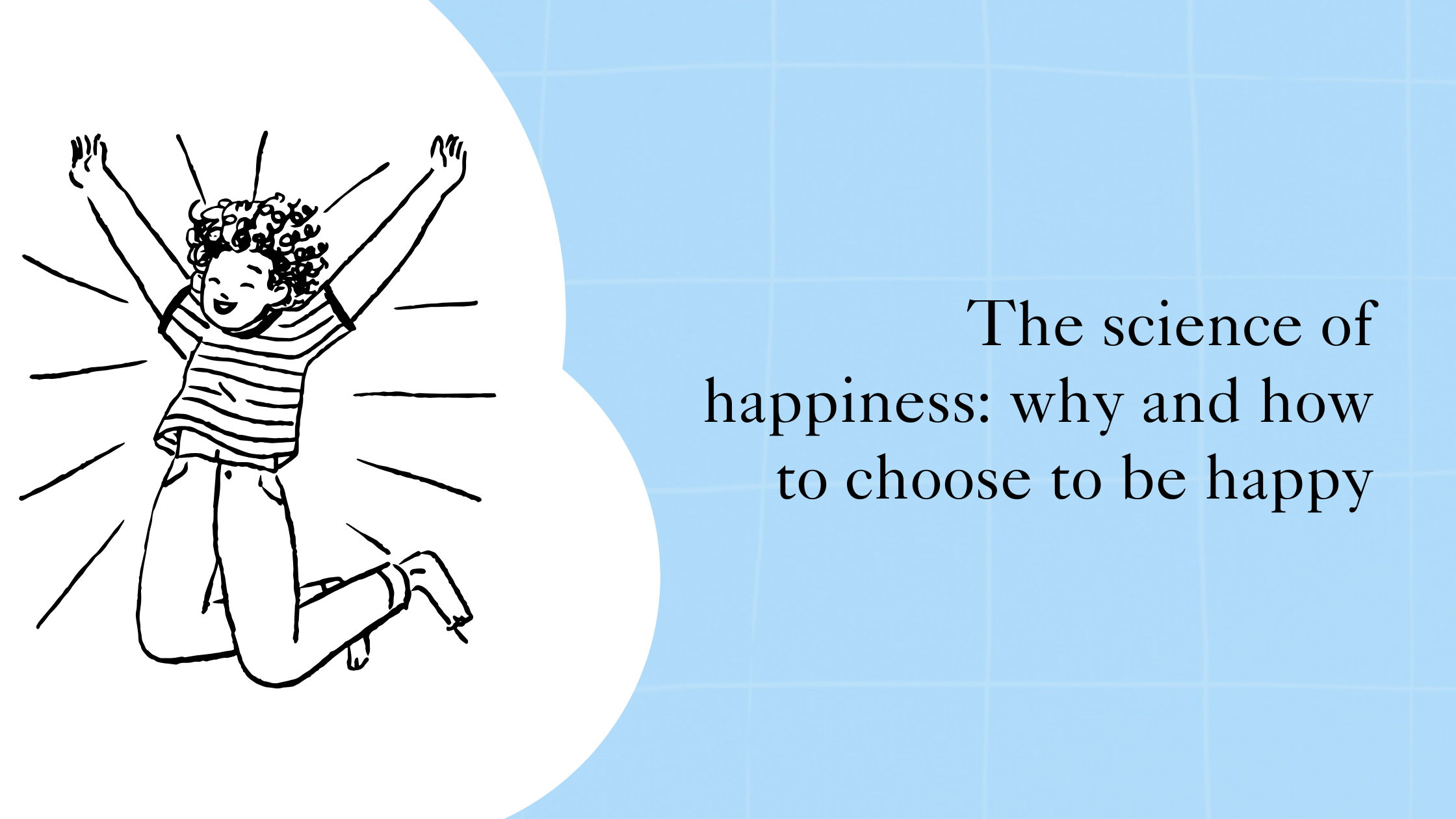« Happiness doesn't depend on what you are or what you have; it only depends on what you think. » - Dale Carnegie
According to some studies, around 40% of our happiness depends on our daily choices and our way of thinking, while only 10% is linked to external circumstances and 50% to our genetic make-up. These figures underline an encouraging reality: despite life's obstacles, we have real power over our happiness.
Contrary to popular belief, happiness is not a destination to be reached, but an active process influenced by our decisions. Positive psychology research shows that by adopting certain habits and practising an optimistic outlook on life, we can actually improve our well-being. In other words, happiness is not just a passive state, but a conscious choice that can be cultivated.
This article explores how we can all exercise this personal power to choose happiness. Through principles derived from science and practical advice, we'll discover how to integrate practices that promote lasting well-being into our lives. You'll see that happiness is within reach, starting today, for those who choose to actively embrace it.

Understanding happiness - what is it and why is it important?
Definition of happiness
Happiness is not simply a matter of ‘being happy’ all the time, as it is natural and even essential to go through a variety of emotions in everyday life. Rather than being a constant state of euphoria, happiness also includes feelings of satisfaction, tranquillity and sometimes even neutrality. It is a mosaic of small moments and pleasant experiences which, when accumulated, contribute to an overall sense of well-being. Happiness manifests itself in the ability to enjoy simple pleasures, to feel at peace with oneself, and to see life's challenges as opportunities to grow.
Common myths
There are many misconceptions about happiness. For example, we often think that happiness depends solely on external circumstances such as professional success, material possessions or great achievements. However, research shows that while these elements may bring temporary satisfaction, they do not guarantee lasting happiness. Another myth is that happiness is a permanent state of euphoria. The reality is that happiness is also made up of neutral moments and serene satisfaction, rather than excessively positive emotions. These small daily satisfactions, such as a good meal, an exchanged smile, or a moment of calm, build a solid foundation of well-being.
Why happiness is important
Happiness has significant effects on our mental and physical health. Being happy boosts our immune system, helps regulate stress and improves our ability to cope with challenges. Mentally, people who cultivate happiness, even in moments of calm or neutrality, develop greater resilience and a more optimistic outlook. Socially, they build more solid and balanced relationships. By building moments of contentment and calm into our daily lives, we can create a stable and rewarding sense of happiness that stays with us even during the most difficult times.
The science behind happiness
Positive psychology
Positive psychology is a field of psychology that focuses on the study of the positive aspects of the human experience. Rather than focusing solely on mental disorders or personal challenges, positive psychology seeks to understand what makes life fulfilling. Positive psychology researchers explore topics such as happiness, resilience, gratitude and social relationships, identifying practices that promote lasting well-being. According to this discipline, happiness can be cultivated through concrete, intentional actions, such as expressing gratitude, setting meaningful goals and maintaining social ties.
Genetic versus environmental factors
It has been proven that our capacity for happiness depends in part on our genetic make-up. Around 50% of our predisposition to happiness is thought to be influenced by hereditary factors. This means that some people naturally tend to be more optimistic or resilient, while others may experience happiness differently. However, the remaining 50% is influenced by external factors and personal choices, such as social environment, daily activities, and our perception of life events. In other words, although we cannot change our ‘genetic starting point’, we do have significant scope to actively influence our level of happiness through choices and habits.
The role of the brain
Happiness is also influenced by chemical processes in the brain. Neurotransmitters, such as dopamine and serotonin, play an essential role in regulating our emotions and well-being. Dopamine, often referred to as the ‘pleasure hormone’, is released when we accomplish something pleasurable or reach a goal, boosting our motivation and satisfaction. Serotonin, on the other hand, is associated with feelings of calm and well-being. These neurotransmitters can be modulated by certain actions, such as physical exercise, meditation and even social interaction. For example, a walk in the open air or a moment of gratitude activates the secretion of these well-being hormones, showing how our behaviour directly influences our state of mind.

The choice to be happy - How can we get there?
1. Gratitude
Gratitude is a powerful tool for enhancing happiness, and research shows that it can improve our mental health and increase our feelings of well-being. Gratitude helps us focus on what we already have, appreciate small victories and feel deep contentment. Gratitude diaries are an effective way of integrating gratitude into our daily lives: all we have to do each day is write down a few things for which we are grateful, whether it's a pleasant moment, a kind gesture, or even a simple ray of sunshine. These exercises remind us of the positive aspects of our lives, developing a more positive and resilient outlook.
2. The power of relationships
Social relationships play a central role in our happiness. Support, listening and positive exchanges with others contribute to our emotional well-being and sense of belonging. Studies show that people with strong social ties and caring relationships are happier and more resilient in the face of difficulties. To cultivate this social support, it's important to look after our relationships, communicate regularly and seek to strengthen our connections. Spending quality time with friends and family, offering help or sharing authentic moments are all ways of enriching our happiness.
3. Mindfulness and meditation
Meditation and mindfulness are effective practices for regulating mood and increasing life satisfaction. Mindfulness involves being fully present in the moment, observing our thoughts without judgement, and welcoming our emotions. Practising mindfulness and meditation helps to reduce stress, improve concentration and enhance our overall well-being. By incorporating a few minutes of meditation a day, we can train our mind to stay calmer and respond more calmly to life's challenges. This creates a solid foundation for cultivating happiness, even in the midst of daily ups and downs.
4. Set meaningful targets
Personal goals and values play an essential role in the quest for happiness. By setting goals that are aligned with our deepest values and aspirations, we direct our energy towards actions that enrich our lives. These goals can be personal, professional or social, but the most important thing is that they are meaningful and in line with what we really want to achieve. By working towards these goals, we develop a sense of satisfaction and fulfilment, which contributes to a fuller, happier life. Reflecting on our values, setting priorities and adjusting our daily lives to move in this direction allows us to live in an intentional and fulfilling way.
Developing a mindset geared towards happiness
1. Cognitive bias
Our thoughts have a profound influence on our perception of reality and, by extension, our happiness. Cognitive biases are thought patterns that often lead us to interpret situations in a pessimistic or unrealistic way. For example, the negativity bias causes us to pay more attention to negative experiences than positive ones, even if they are rare. A key step in developing a more positive mindset is to identify these automatic negative thoughts and question them. For example, by asking ourselves ‘Is this really true?’ or ‘Is there another way to look at this situation?’, we can challenge our limiting beliefs and adopt a more balanced and constructive vision.
2. Learned optimism
Learned optimism is an ability that can be developed with practice, in particular using techniques from cognitive reappraisal and cognitive behavioural therapy (CBT). These approaches help us to recognise and change the negative thought patterns that limit our happiness. For example, CBT uses exercises to analyse automatic thoughts and find more positive, realistic alternatives. Cognitive reappraisal, on the other hand, involves reframing a situation by finding positive aspects or learning opportunities. By applying these techniques, we can cultivate a mindset that sees challenges not as obstacles, but as opportunities for growth, thus contributing to more sustainable well-being.
3. Taking care of yourself
A mind focused on happiness begins by listening to and satisfying your personal needs. Taking care of yourself means looking after your body as well as your mind, setting aside time for relaxation, physical exercise and personal care. Physical health, such as sleep, diet and physical activity, has a direct impact on our state of mind and emotions. Similarly, taking care of our mental well-being - through relaxation, creative activities or time for ourselves - strengthens our ability to manage stress and stay positive. Taking care of ourselves is not selfish: it's a commitment to ourselves to cultivate a more balanced and happier life.
Summary
In conclusion, happiness is not a state that is inaccessible or reserved for some, but an experience that everyone can influence by taking concrete, intentional steps. We have explored the nature of happiness and the importance of the choices we make to cultivate it. Through practices such as gratitude, nurturing social relationships, mindfulness, setting goals and developing a positive state of mind, we can steer our lives towards greater well-being and lasting satisfaction.
A call to action
I encourage you to try at least one of the techniques discussed here - whether it's keeping a gratitude journal, nurturing your relationships or re-evaluating a negative thought. These simple but powerful practices can, over time, transform your approach to happiness and strengthen your resilience in the face of challenges.

Want to know more? Here are some links you might find useful
Articles
- You Really Can Decide to Be Happy. Science Says SoScience says happiness is a choice, as long as you turn that thought into action. - Inc.
- Choosing To Be Happy - Strategies for Happiness: 7 Steps to Becoming a Happier Person - WebMD
Videos
- Want to be happy? Be grateful | David Steindl-Rast - TED
- Why Happiness Is A Choice - Deep Dive with Ali Abdaal
If you would like to discover more content on personal and professional development, please click on this link to access other similar articles.

